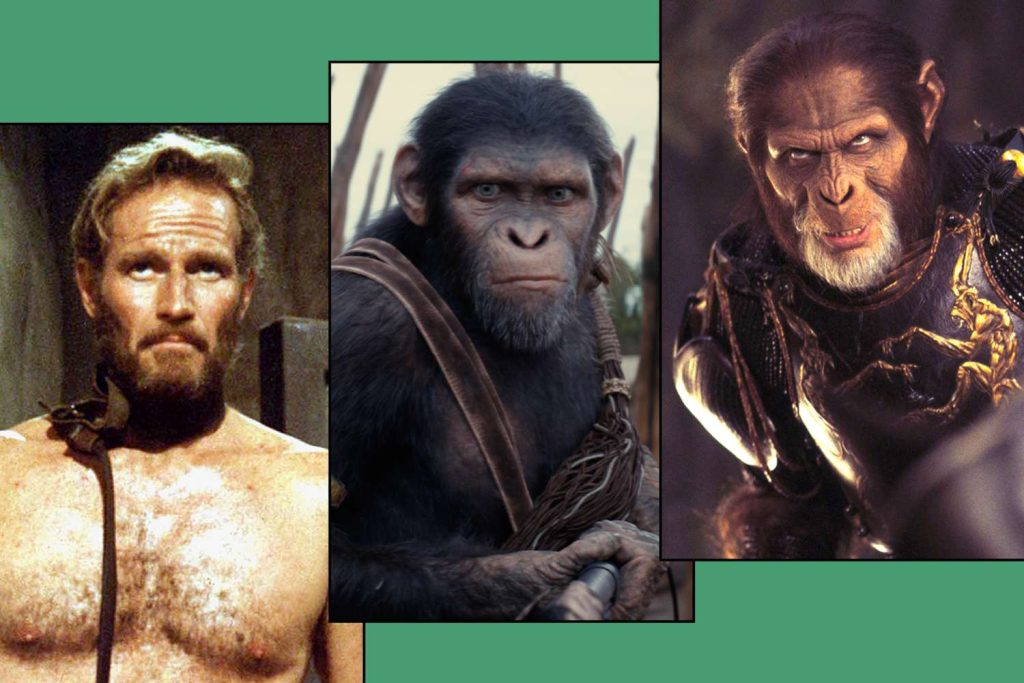:max_bytes(150000):strip_icc():format(jpeg)/Planet-of-the-Apes-movies-in-order-021325-65466b43a5c54ff4811fd36e50ea394a.jpg)
When discussing blockbuster franchises, the likes of Star Wars, Marvel, and Jurassic Park tend to dominate the conversation. But you needn’t look further than the commercial and critical success of recent Planet of the Apes movies to realize these simians can hold their own against Jedis, superheroes, and bioengineered dinos.
Since the 2011 blockbuster Rise of the Planet of the Apes, fans have been treated to regular installments of the sci-fi franchise for nearly 15 years. And with 2024’s Kingdom of the Planet of the Apes kicking off a brand new storyline, the popular primates aren’t going anywhere.
But the series began pounding its chest long ago with the 1968 original, long before a mo-capped Andy Serkis led an evolutionary leap as Caesar. If you’re craving some history on one of Hollywood’s longest-running film franchises — or simply want to catch up on all 10 installments — read on for how to watch the Planet of the Apes movies in chronological order.
Rise of the Planet of the Apes (2011)
Everett Collection
Rise of the Planet of the Apes came long after the original five movies and an earlier misbegotten attempt to reboot the franchise. But it’s the first installment to tell a full origin story from the beginning — and it finally features words spoken by an ape at the tail end.
Set in the aughts, the film details a young chemist’s (James Franco) attempt to develop a cure for Alzheimer’s by testing an in-progress drug on a young chimpanzee named Caesar. It works… only far better than intended. Rather than simply curing degeneration, it improves brainpower exponentially, thus sewing the seeds for a planet dominated by apes.
Dawn of the Planet of the Apes (2014)
Everett Collection
Rise successfully rebooted the Planet of the Apes franchise, but this even better sequel solidified the simians’ return to pop culture prominence. Set about a decade later, Matt Reeves’ follow-up film catches up with Caesar in his established community of advanced apes near San Francisco.
While the chimps’ modest colony is just beginning to coalesce, a population-wiping plague has put the primates on a level playing field with the human race. Elevated by Toby Kebbell’s stellar mo-cap turn as the bitter, villainous chimp Koba — not to mention the strong human performances by Jason Clarke, Gary Oldman, and Keri Russell — Dawn deftly explores the delicate, uneasy dynamic between man and ape as they try to peacefully coexist, but ultimately grease the gears of the coming war.
War for the Planet of the Apes (2017)
Twentieth Century Fox
As this trilogy capper’s title suggests, attempts at peace between apes and humans have failed miserably. But the conflict works in the finale’s favor, fueling an epic conclusion that combines all the thrills of a high-octane blockbuster with the nuanced characterizations and thoughtful storytelling that previously distinguished Rise and Dawn from your typical action-movie fare.
Reeves and Serkis both return at the top of their respective games, while Woody Harrelson joins War for the Planet of the Apes‘ ranks as a terrifying, Caesar-torturing baddie dubbed “The Colonel.” Arguably the best entry of the excellent reboot trilogy, War not only spins a fantastic standalone story but also serves up the perfect ending to Caesar’s arc.
Where to watch War for the Planet of the Apes: Amazon Prime Video (to rent)
Kingdom of the Planet of the Apes (2024)
20th Century Studios
Given how well the previous film tied up the reboot trilogy, this most recent installment could have felt more like a cash grab than a creatively driven fresh start. But Kingdom of the Planet of the Apes — helmed by Maze Runner trilogy director Wes Ball with a new cast of humans and chimps — surprised fans and critics alike, taking the series in a different direction while successfully setting the stage for future installments.
Kingdom unfolds in the same continuity as the previous three films but picks up 300 years later when the planet has finally been claimed by the apes.
Planet of the Apes (1968)
Silver Screen Collection/Hulton Archive/Getty
The original Planet of the Apes movie’s setup is eerily simple: An astronaut and his crew crash-land on a mysterious planet and travel over 2,000 years into the future. They launched their voyage in 1972 and it is now, in their terms, the year 3978. They discover, to their horror, that the planet is populated by intelligent, civilized talking apes who are equally surprised to see a human who can speak.
The Charlton Heston-led classic is remembered for its quotable lines — “Take your stinking paws off me, you damned, dirty ape!” — and a twist ending that probably taught M. Night Shyamalan a thing or two. Beyond those enduring elements, the movie is a sci-fi sensation that fueled an ongoing franchise.
Where to watch Planet of the Apes: Amazon Prime Video (to rent)
Beneath the Planet of Apes (1970)
20th Century Fox/Courtesy: Everett
Given Planet of the Apes‘ enormous success, it’s no surprise Hollywood quickly greenlit a sequel. Unfortunately, like so many fast-tracked follow-ups, Beneath the Planet of the Apes — which is set just after the events of its predecessor — feels like a hasty, undercooked attempt to recapture the talking-monkey magic of the original.
Heston appears only in a small role, while Roddy McDowall — who earned acclaim for his portrayal of chimpanzee Cornelius in the original — sits this film out entirely. Toss in a half-baked plot involving an apocalypse-surviving cult of telepathic humans, and this sophomore effort is best left buried in a ’70s time capsule. The one thing that does set it apart is the explosive ending, which… well, doesn’t leave much room for sequels.
Where to watch Beneath the Planet of the Apes: Amazon Prime Video (to rent)
Escape from the Planet of the Apes (1971)
Mary Evans/20TH CENTURY FOX/Ronald Grant/Everett
Arriving just a year after its commercially successful (yet critically panned) predecessor, Escape from the Planet of the Apes is generally considered the second-best entry among the original five films. Focusing on characters and narrative over mindless action, it spins a smaller, emotional story with more social commentary and less cheesy special effects.
How does Escape even exist in continuity with the previous movie given Beneath’s ending? Time travel, of course. It shows us that, before the last film’s climax, Dr. Cornelius travels back to 1973 with wife Zira (Kim Hunter). The couple’s adventure takes a dark turn when the “present-day” humans don’t exactly welcome the smart chimps with open arms. Their harrowing journey — through capture, persecution, and desperate escape — works as a fantastic standalone tale.
In reinventing the franchise’s setting and focus, Escape essentially launches a separate timeline from what came before it.
Where to watch Escape from the Planet of the Apes: Amazon Prime (to rent)
Conquest of the Planet of the Apes (1972)
20th Century Fox/Courtesy: Everett
The fourth entry finds the series once again tackling a more personal story focused on relatable social issues. In exploring the origin of the apes’ rebellion, uprising, and eventual rule over the planet, Conquest — set primarily in the 1990s — depicts the primates as family pets that are eventually enslaved.
The narrative has its share of tonal inconsistencies that can make the film feel quite preachy. Still, director J. Lee Thompson delivers an engaging yarn anchored by another stellar turn from McDowall. Interestingly, however, this time the actor dons the primate prosthetics as Caesar, Cornelius and Zira’s rebellion-leading offspring and the inspiration for Andy Serkis’ character in the recent reboot trilogy.
Where to watch Conquest of the Planet of the Apes: Amazon Prime Video (to rent)
Battle for the Planet of the Apes (1973)
20th Century Fox/Courtesy: Everett
While the series was way ahead of its time as a high-concept, time- and space-spanning franchise, it also got a headstart on franchise fatigue. As the fifth film in six years, Battle for the Planet of the Apes represented the brand’s lowest point.
The movie, which primarily takes place in the early 21st century with a framing narrative in 2670, is regarded by many as the worst entry. It suffers from a limited budget, lack of original ideas, and an overall sense that talking apes have overstayed their welcome. Despite another solid performance from McDowall — whose returning ape ruler Caesar now finds himself at war with the human race — Battle was the final film of the original timeline and the last installment for nearly 30 years.
Where to watch Battle for the Planet of the Apes: Amazon Prime Video (to rent)
Planet of the Apes (2001)
Sam Emerson/20th Century Fox
Wedged between the original pentalogy and the current series of Apes movies, director Tim Burton‘s attempted reboot is a bit of an outlier. A sorta-remake of the original, it seemed to have the right ingredients, from the director himself to cutting-edge prosthetics, to a rising star in Mark Wahlberg, who had become a bankable leading man (Boogie Nights, Three Kings, The Perfect Storm).
Despite that pedigree, Apes failed to revive the franchise. Like previous entries, the storyline involves time travel, taking off in 2029 and landing in the year 5021. The film is largely void of Burton’s unmistakable style and suffers from bloated pacing and a bad attempt to, er, ape the original’s twist ending.






